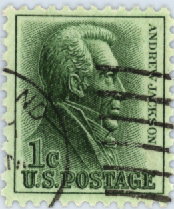Andrew Jackson 1767-1845 A brief biography
Jackson's duel with Charles Dickinson
 Andrew Jackson had a fierce will and sometimes savage temper, both illustrated
in the following, in which some background is provided as it illustrates
the society Jackson lived in:
Andrew Jackson had a fierce will and sometimes savage temper, both illustrated
in the following, in which some background is provided as it illustrates
the society Jackson lived in:
In 1805 a friend of Jackson's deprecated the manner in which Captain Joseph Ervin had handled a bet with Jackson over a horse race. Ervin's son-in-law, Charles Dickinson became enraged and started quarreling with Jackson's friend which lead to Jackson becoming involved. Dickinson wrote to Jackson calling him a "coward and an equivicator". The affair continued, with more insults and misunderstandings, until Dickinson published a statement in the Nashville Review in May 1806, calling Jackson a "worthless scoundrel, ... a poltroon and a coward".
Jackson challenged Dickinson to a duel very much according to the customs of the time in the south. Dickinson, known as one of the best shots in Tennessee if not the best, had choice of weapons and chose pistols.
Dickinson fired the first shot, which broke two of Jackson's ribs and lodged two inches from his heart. Dickinson then had to stand at the mark as Jackson, clutching his chest, aimed slowly and shot him fatally.
Though acceptable by the code of the times, many people considered it a cold-blooded killing. I presume the rules of engagement were for each man to draw and fire at the same time, upon hearing the signal, but if one fired, there was no "second round" until the other man fired. The implication is that magnanimity would have required Jackson to fire into the air rather than taking a slow deliberate aim at 24 feet.
Jackson's wound never healed properly and abcesses formed around the bullet, causing pain and some debilitation for Jackson's remaining 39 years.
